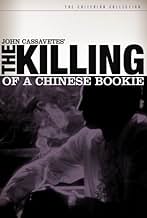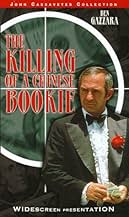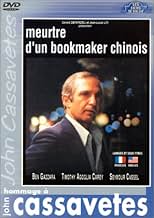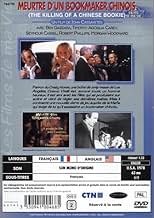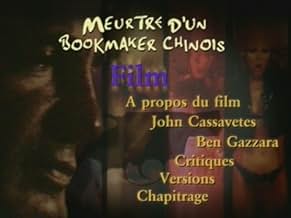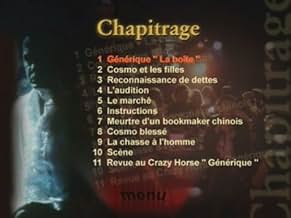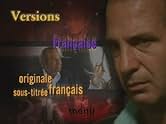Mord an einem chinesischen Buchmacher
Ein stolzer Strip-Club-Besitzer ist gezwungen, sich mit sich selbst als Mann zu arrangieren, als seine Spielsucht ihn in Konflikt mit der Mafia bringt, die ihm nur eine Alternative bietet.Ein stolzer Strip-Club-Besitzer ist gezwungen, sich mit sich selbst als Mann zu arrangieren, als seine Spielsucht ihn in Konflikt mit der Mafia bringt, die ihm nur eine Alternative bietet.Ein stolzer Strip-Club-Besitzer ist gezwungen, sich mit sich selbst als Mann zu arrangieren, als seine Spielsucht ihn in Konflikt mit der Mafia bringt, die ihm nur eine Alternative bietet.
- Flo
- (as Timothy Agoglia Carey)
- The Accountant
- (as John Red Kullers)
- Margo Donnar
- (as Donna Marie Gordon)
Empfohlene Bewertungen
Yet, it's very difficult not to be compelled by the story, especially as embodied in the character of Cosmo Vitelli, who Ben Gazzara seems to channel effortlessly, as if he were a second, transparent skin.
Cosmo is a fascinating character. He owns a rather ratty strip club/cabaret joint on the Sunset Strip that fronts production values and performers of the qualities mentioned earlier, does middling business, and spends nearly every dime he makes "living the high life" or the "the image" of what someone in his profession should espouse. He swills $100 bottles of Champagne, cruises around town in his plush chauffeured Caddy, an entourage of bimbettes in tow, usually to a dive mob-run poker joint that inevitably lands him in massive debt.
He would be an easy character to scorn or mock in another film, but not as Gazzara and Cassavetes portray him. Cosmo is proud of his little world and his accomplishments, and further more, could not give a damn if anyone doesn't approve of them. "You have no style," he sneers at gangster Al Ruban early in the film after the thug condescends to him.
As weird as it sounds, you have to respect someone like that, even when he finds himself increasingly trapped by circumstances and succumbing to self-doubt. At the end of the picture he says how important it is to "feel comfortable" with oneself and while we don't believe for a second that Cosmo really feels this way, we know he *wants* to. It's a refreshingly human response in a movie that only contains more of the same.
It's not a conventional audience pleaser by any means, but if you've watched other Cassavetes pictures and like his candid stream-of-consciousness style, give the 1978 edited version of "Bookie" a watch before you see the original. Cass not only cut half an hour of footage, he did it with (what else?) incredible style and creativity, really tightening the structure of the film as a whole, considerably juicing its already engaging premise.
Quite possibly the most overlooked gem from one of the '60s and '70s most commercially under-appreciated directors.
While Cassavetes' film lacks the polish of the two Scorsese films, I think that benefits "Killing". This is not a glossy, "high-concept" film that Hollywood prefers (although Scorsese is certainly not "high-concept"); it is a rough, confusing muddle and that is probably one of the reasons the film remains highly unseen by a great many people. However, I like rough, confusing films and one of the great pleasures is trying to figure everything out. The beauty of a John Cassavetes film is that there are no easy answers and he likes you to make your own reading on the film.
As always with a Cassavetes film, he gives juicy parts to his regulars. Ben Gazzara is excellent as Cosmo Vitelli, the nightclub owner who needs to perform the title deed to save his club. Seymour Cassel gives a strong performance as a friend of Cosmo. Cassel and Gazarra are two of those actors whose names you won't recognize, but when you see their faces, you'll recognize them. They love to take risks with their performances and you can see the payoffs for yourselves.
After a half-assed release by Buena Vista in 1989, "Killing of A Chinese Bookie" is finally available on tape and DVD from Anchor Bay Entertainment. The transfer is clean and looks great and the letterbox presentation shows that Cassavetes knew how to use his camera, even if the aspect ratio is small.
The plot of 'Bookie' is pretty straightforward. A strip club owner gets into debt with the Mob and is pressured into murdering a bookie. Other directors such as Scorsese or Frankenheimer or Friedkin or Mann could have made an tight, exciting thriller out of such a plot. But John Cassavetes goes for a completely different approach, and doesn't play by "the rules". He ignores the obvious way of proceeding, slows things down, focuses on characters and relationships and moments, and ends up with a cinematic poem.
That may sound pretentious to some, so be it, but that's what it is. The beauty of the photography combined with the improvised dialogue by some of the best character actors of American post-War movies (Gazzara, Cassel, Carey), makes this movie unique. There's nothing quite like this movie, and it's one that if you sit back and just let it do its thing, will remain absolutely unforgettable.
One of the 1970s greatest achievements.
Wusstest du schon
- WissenswertesDavid Bowie was often present on set during the filming and can be seen in shots of the crowd at Cosmo's Crazy Horse West.
- PatzerFlo says "That jerk Karl Marx said opium is the religion of the people."
While the actual Marx quote is "Religion is the opiate of the masses", this is likely to be an intentional misquote from the gangster, showing a lack of true education.
- Zitate
Cosmo Vitelli: Now, teddy. Teddy. Everything takes work. We'll straighten it out. You know. You gotta work hard to be comfortable. Yeah, a lot of people kid themselves, you know. They-they know when they were born, they know where they're goin'... they know whether they're gonna go to heaven,whether they're gonna go to hell. They think they know that. They kid themselves. Right? But the only people... who are, you know, happy... are the people who are comfortable. That's right. Now, you take, uh, uh, carol, right? A dingbat, right? A ding-a-ling.A dingo. That's what people think she is,'cause that's the truth they want to believe. But, uh, you put her in another situation, right? Put her in a situation that's tough. Stress. Where she's up against something,you'll see she's no fool. Right. 'cause what's your truth... is my falsehood What's my falsehood is your truth and vice versa. Well, look. Look at me, right? I'm only happy when I'm angry... when I'm sad, when i can play the fool... when i can be what people want me to be rather than be myself.
- Crazy CreditsOpening scene has Chinese characters scrolling up, similar to a movie from China or Hong Kong.
- Alternative VersionenThe original version runs 135 minutes. Two years after the release director John Cassavetes prepared a different theatrical cut with a running time of 108 minutes, both adding and removing scenes resulting in a different film.
- SoundtracksI Can't Give You Anything but Love
(uncredited)
Music by Jimmy McHugh
Lyrics by Dorothy Fields
Performed by Meade Roberts and others
Top-Auswahl
- How long is The Killing of a Chinese Bookie?Powered by Alexa
Details
- Erscheinungsdatum
- Herkunftsland
- Sprache
- Auch bekannt als
- The Killing of a Chinese Bookie
- Drehorte
- Gazzarri's, 9039 Sunset Blvd., West Hollywood, Kalifornien, USA(Interior and exteriors. Cosmo Vittelli's nightclub, Crazy Horse West.)
- Produktionsfirma
- Weitere beteiligte Unternehmen bei IMDbPro anzeigen
Box Office
- Weltweiter Bruttoertrag
- 19.399 $


